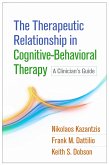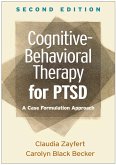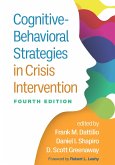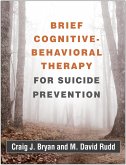Sarah J. Egan (Australia Curtin University), Tracey D. Wade (Australia Flinders University), Roz Shafran (United Kingdom University College London)
Cognitive-Behavioral Treatment of Perfectionism
Sarah J. Egan (Australia Curtin University), Tracey D. Wade (Australia Flinders University), Roz Shafran (United Kingdom University College London)
Cognitive-Behavioral Treatment of Perfectionism
- Broschiertes Buch
- Merkliste
- Auf die Merkliste
- Bewerten Bewerten
- Teilen
- Produkt teilen
- Produkterinnerung
- Produkterinnerung
This practical resource provides an evidence-based framework for treating clients struggling with perfectionism, whether as the main presenting problem or in conjunction with depression, eating disorders, anxiety disorders, or obsessive-compulsive disorder.
Andere Kunden interessierten sich auch für
![Cognitive-Behavioral Treatment of Perfectionism Cognitive-Behavioral Treatment of Perfectionism]() Sarah J. Egan (Curtin University, Perth, Australia)Cognitive-Behavioral Treatment of Perfectionism73,99 €
Sarah J. Egan (Curtin University, Perth, Australia)Cognitive-Behavioral Treatment of Perfectionism73,99 €![Cognitive-Behavioral Therapy in Groups Cognitive-Behavioral Therapy in Groups]() Peter J. Bieling (McMaster University and St. Joseph's HealthcareCognitive-Behavioral Therapy in Groups98,99 €
Peter J. Bieling (McMaster University and St. Joseph's HealthcareCognitive-Behavioral Therapy in Groups98,99 €![The Therapeutic Relationship in Cognitive-Behavioral Therapy The Therapeutic Relationship in Cognitive-Behavioral Therapy]() Nikolaos Kazantzis (Australia Monash University)The Therapeutic Relationship in Cognitive-Behavioral Therapy48,99 €
Nikolaos Kazantzis (Australia Monash University)The Therapeutic Relationship in Cognitive-Behavioral Therapy48,99 €![Evidence-Based Practice of Cognitive-Behavioral Therapy Evidence-Based Practice of Cognitive-Behavioral Therapy]() Deborah Dobson (Canada University of Calgary)Evidence-Based Practice of Cognitive-Behavioral Therapy43,99 €
Deborah Dobson (Canada University of Calgary)Evidence-Based Practice of Cognitive-Behavioral Therapy43,99 €![Cognitive-Behavioral Therapy for Ptsd Cognitive-Behavioral Therapy for Ptsd]() Claudia ZayfertCognitive-Behavioral Therapy for Ptsd54,99 €
Claudia ZayfertCognitive-Behavioral Therapy for Ptsd54,99 €![Cognitive-Behavioral Strategies in Crisis Intervention Cognitive-Behavioral Strategies in Crisis Intervention]() Cognitive-Behavioral Strategies in Crisis Intervention73,99 €
Cognitive-Behavioral Strategies in Crisis Intervention73,99 €![Brief Cognitive-Behavioral Therapy for Suicide Prevention Brief Cognitive-Behavioral Therapy for Suicide Prevention]() Craig J. Bryan (United States University of Utah)Brief Cognitive-Behavioral Therapy for Suicide Prevention55,99 €
Craig J. Bryan (United States University of Utah)Brief Cognitive-Behavioral Therapy for Suicide Prevention55,99 €-
-
-
This practical resource provides an evidence-based framework for treating clients struggling with perfectionism, whether as the main presenting problem or in conjunction with depression, eating disorders, anxiety disorders, or obsessive-compulsive disorder.
Hinweis: Dieser Artikel kann nur an eine deutsche Lieferadresse ausgeliefert werden.
Hinweis: Dieser Artikel kann nur an eine deutsche Lieferadresse ausgeliefert werden.
Produktdetails
- Produktdetails
- Verlag: Guilford Publications
- Seitenzahl: 402
- Erscheinungstermin: 29. Juni 2016
- Englisch
- Abmessung: 228mm x 151mm x 30mm
- Gewicht: 590g
- ISBN-13: 9781462527649
- ISBN-10: 1462527647
- Artikelnr.: 44608517
- Herstellerkennzeichnung
- Produktsicherheitsverantwortliche/r
- Europaallee 1
- 36244 Bad Hersfeld
- gpsr@libri.de
- Verlag: Guilford Publications
- Seitenzahl: 402
- Erscheinungstermin: 29. Juni 2016
- Englisch
- Abmessung: 228mm x 151mm x 30mm
- Gewicht: 590g
- ISBN-13: 9781462527649
- ISBN-10: 1462527647
- Artikelnr.: 44608517
- Herstellerkennzeichnung
- Produktsicherheitsverantwortliche/r
- Europaallee 1
- 36244 Bad Hersfeld
- gpsr@libri.de
Sarah J. Egan, PhD, is a senior research fellow and previous Director of Clinical Psychology in the School of Psychology at Curtin University in Perth, Western Australia. Her primary research interest is cognitive-behavioral therapy (CBT) for clinical perfectionism; she also publishes in the areas of obsessive-compulsive disorder and eating disorders. The recipient of awards for her teaching and high-impact publications, Dr. Egan serves on the editorial board of Stress and Health and is chair of the organizing committee of the World Congress of Behavioral and Cognitive Therapies. She has presented numerous workshops and papers on CBT for clinical perfectionism and has over 40 publications in peer-reviewed journals. Tracey D. Wade, PhD, is Professor and Dean of the School of Psychology at Flinders University in Adelaide, South Australia. She has worked as a clinician in the area of eating disorders for over 20 years. Her research interests are in the etiology, prevention, and treatment of eating disorders. Dr. Wade is Editor-in-Chief of the Australian Psychological Society (APS) journal Clinical Psychologist and is a member of the Steering Committee of the National Eating Disorder Collaboration in Australia. She is a recipient of the Ian M. Campbell Memorial Prize and of the Early Career Award, both from the APS, and has published more than 130 peer-reviewed scientific articles. Roz Shafran, PhD, is Professor of Translational Psychology at the Institute of Child Health, University College London, United Kingdom. She is the founder and former director of the Charlie Waller Institute of Evidence-Based Psychological Treatment, Associate Editor of Behaviour Research and Therapy, and scientific co-chair of the British Association of Behavioural and Cognitive Psychotherapies. Dr. Shafran's clinical research interests include cognitive-behavioral theories of and treatments for eating disorders, obsessive-compulsive disorder, and perfectionism across the age range. She is a recipient of the Award for Distinguished Contributions to Professional Psychology from the British Psychological Society and the Marsh Award for Mental Health Work. With more than 100 peer-reviewed scientific publications, Dr. Shafran is coauthor (with Sarah Egan and Tracey D. Wade) of the self-help guide Overcoming Perfectionism. Martin M. Antony, PhD, is Professor of Psychology at Toronto Metropolitan University in Toronto, Ontario, Canada, and Provincial Clinical and Training Lead for the Ontario Structured Psychotherapy Program. Previously, Dr. Antony was founding director of both the Anxiety Treatment and Research Clinic and the Psychology Residency Program at St. Joseph's Healthcare Hamilton. He has published over 300 scientific articles and chapters and 33 books in areas related to cognitive-behavioral therapy and anxiety-related disorders, and has presented his work widely across four continents. A Fellow of the Royal Society of Canada, he is past president of the Canadian Psychological Association and the Association for Behavioral and Cognitive Therapies.
1. Nature and Causes of Perfectionism
2. Research on the Treatment of Perfectionism
3. Perfectionism across Psychopathology
4. Perfectionism as a Transdiagnostic Process
5. Assessment of Perfectionism
6. Treatment Planning, Homework, and Supervision
7. The Cognitive-Behavioral Model of Perfectionism and Collaborative
Formulation
8. The Therapeutic Alliance and Engagement
9. Self-Monitoring, Psychoeducation, and Surveys
10. Thinking Errors
11. Cognitive Strategies
12. Behavioral Experiments
13. Self-Evaluation and Self-Criticism
14. Procrastination and Time Management
15. Relapse Prevention
16. Emerging Approaches in Treatment of Perfectionism
Appendix 1. Resources
Appendix 2. Handouts
Appendix 3. Self-Report Measures
References
Index
2. Research on the Treatment of Perfectionism
3. Perfectionism across Psychopathology
4. Perfectionism as a Transdiagnostic Process
5. Assessment of Perfectionism
6. Treatment Planning, Homework, and Supervision
7. The Cognitive-Behavioral Model of Perfectionism and Collaborative
Formulation
8. The Therapeutic Alliance and Engagement
9. Self-Monitoring, Psychoeducation, and Surveys
10. Thinking Errors
11. Cognitive Strategies
12. Behavioral Experiments
13. Self-Evaluation and Self-Criticism
14. Procrastination and Time Management
15. Relapse Prevention
16. Emerging Approaches in Treatment of Perfectionism
Appendix 1. Resources
Appendix 2. Handouts
Appendix 3. Self-Report Measures
References
Index
1. Nature and Causes of Perfectionism
2. Research on the Treatment of Perfectionism
3. Perfectionism across Psychopathology
4. Perfectionism as a Transdiagnostic Process
5. Assessment of Perfectionism
6. Treatment Planning, Homework, and Supervision
7. The Cognitive-Behavioral Model of Perfectionism and Collaborative
Formulation
8. The Therapeutic Alliance and Engagement
9. Self-Monitoring, Psychoeducation, and Surveys
10. Thinking Errors
11. Cognitive Strategies
12. Behavioral Experiments
13. Self-Evaluation and Self-Criticism
14. Procrastination and Time Management
15. Relapse Prevention
16. Emerging Approaches in Treatment of Perfectionism
Appendix 1. Resources
Appendix 2. Handouts
Appendix 3. Self-Report Measures
References
Index
2. Research on the Treatment of Perfectionism
3. Perfectionism across Psychopathology
4. Perfectionism as a Transdiagnostic Process
5. Assessment of Perfectionism
6. Treatment Planning, Homework, and Supervision
7. The Cognitive-Behavioral Model of Perfectionism and Collaborative
Formulation
8. The Therapeutic Alliance and Engagement
9. Self-Monitoring, Psychoeducation, and Surveys
10. Thinking Errors
11. Cognitive Strategies
12. Behavioral Experiments
13. Self-Evaluation and Self-Criticism
14. Procrastination and Time Management
15. Relapse Prevention
16. Emerging Approaches in Treatment of Perfectionism
Appendix 1. Resources
Appendix 2. Handouts
Appendix 3. Self-Report Measures
References
Index








